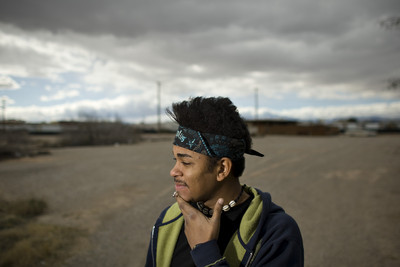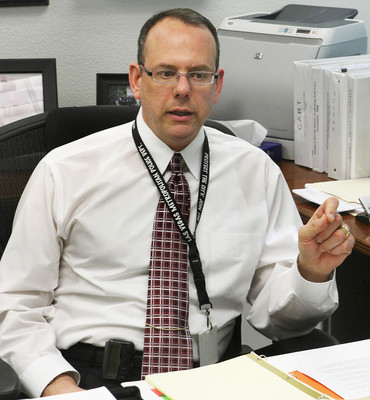Las Vegas police use kinder, gentler approach in dealing with runaways
Yoshi Cooper said he was 11 when his mom handcuffed him inside a closet for three months, freeing him only to go to the bathroom.
Cooper, who now is 20, also remembers episodes of violence when his mother hit his bare feet with a wooden stick and threw a rollerblade boot at him while he slept.
Fed up with the physical and psychological trauma, he ran away from home at age 12.
He spent the majority of three years on his own, bouncing around friends' homes and sleeping on apartment patios or empty lots.
At least three times, Cooper said, police picked him up as a runaway and sent him back to his abusive mother.
"They didn't understand," Cooper said. "They didn't know what they were doing. All they knew was to go by the book."
Las Vegas police said Cooper's story isn't uncommon. That's why the department has changed its approach to dealing with runaways.
In October, the Metropolitan Police Department started the High Risk Runaway Detail and staffed it with three detectives.
Capt. Vincent Cannito said the detectives are responsible for investigating why chronic runaways leave their homes.
Before the detail began, Las Vegas police returned runaways to their family without a formal investigation into why the child left.
"Oftentimes, when you think of runaways, you think they're challenged, they're troublemakers," Cannito said. "We're focusing on the most at-risk (teens) in the county, and we're trying to provide them some level of comfort. If they're being abused at home, we're looking at the parents."
Between October and mid-February, 897 cases of runaway children were investigated by the High Risk Runaway Detail.
Fifty-one were classified as high-risk runaways, meaning the children ran away at least three times within a year.
Cannito said 13 runaways involved in high-risk cases disclosed sexual abuse at home, seven reported physical abuse and 19 told police they were involved in prostitution.
Cannito said police often find children and teenagers are fleeing situations of physical or sexual abuse.
As of Feb. 11, three arrests have been made in connection with the high-risk cases.
Cannito said all other high-risk cases are being investigated for possible criminal prosecution.
The old way of handling runaways is no longer acceptable, Cannito said. "If we don't address the fact these kids are abused, then the crime is on us."
Kathleen Boutin, founder of the nonprofit Nevada Partnership for Homeless Youth, said she was ecstatic Las Vegas police are focusing on why children run away.
She fled her Henderson home at age 12 because she was being abused by her stepfather.
"We don't send domestic violence victims back to their abusers, so why would we do that to adolescents?" Boutin asked.
"I never thought I'd see the day when the Las Vegas Metropolitan Police Department would be so proactive. This is huge."
Boutin said that since 1999, she has spoken with thousands of children and teenagers who have either run away or been kicked out of their homes.
She estimated that nine out of 10 were sexually, physically or mentally harmed. She also said the likelihood is high that their parents or guardians were substance abusers.
Boutin said she commends Las Vegas police for looking at runaways as potential victims and not delinquents.
She hopes Henderson and North Las Vegas police adopt similar programs.
Frederic Reamer, a professor in the graduate program of the School of Social Work at Rhode Island College, coauthored a book on troubled teens and the effectiveness of organizations meant to help them.
Reamer called the Las Vegas police program for runaways, "commendable, and a step in the right direction."
The problem is not just an issue for law enforcement, Reamer said. Professional counselors, drug therapists and mental health experts need to be involved in runaway cases involving abuse.
"Partnership between law enforcement and social services is key," he said.
Like Cannito and Boutin, Reamer said a "significant" number of runaways come from abusive homes.
"While it may be that dad needs to be arrested because he is sexually abusing his stepdaughter, that family is probably in so much chaos that what you need is comprehensive, family-based intervention."
Cooper was able to stabilize his life with assistance from Boutin's organization, which helped him earn a high school diploma and provided housing for him until he could support himself.
He now has a steady job as a security guard, lives in an apartment and has his own car.
Cooper said he doesn't hold a grudge against his mom, even though he felt she should have been arrested when she was abusing him as a child.
Because his mother is dying, Cooper said, she's now trying to reconcile with him.
He can't help but wonder how different his life might have been if he had gotten help as a child.
"I probably would have finished school earlier. I would have gotten better grades. I would have learned about sports," Cooper said.
"I would have learned how to have fun as a kid instead of being a 12-year-old adult."
Contact reporter Antonio Planas at aplanas@reviewjournal.com or 702-383-4638.
MISSING CHILDREN AND RUNAWAYS
Reports filed with Las Vegas police in the past three years.
2008 3,860
2007 3,599
2006 3,845
Source: The Las Vegas Metropolitan Police Department


















